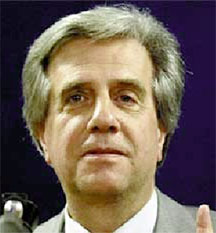MONTEVIDEO, (Reuters) – Tabare Vazquez won back his old job as president of Uruguay in a runoff election yesterday, allowing the leftist ruling coalition to extend its decade in power and roll out a law legalizing the production and sale of marijuana.

Center-right opposition candidate Luis Lacalle Pou quickly conceded defeat after three unofficial quick counts showed Vazquez with over 53 percent support. Lacalle Pou trailed with about 41 percent of the vote.
Hundreds of ruling Broad Front supporters celebrated along a main avenue running through the center of the rain-soaked capital, Montevideo, waving party banners.
Vazquez, 74, will succeed President Jose Mujica, an ally whose straight-talking, unpretentious style won him widespread affection in the cattle-farming country of 3.4 million people.
“The country has changed for the better, we are past the days when people were leaving or children had to eat grass,” said Demetrio Stavrinakis, 82, who like Mujica was a political prisoner during Uruguay’s 1973-1985 military dictatorship.
“Today I see those dreams we once had have become reality and I’m overwhelmed with emotion,” he added.
Official results trickled in at a snail’s pace.
Vazquez was president from 2005 to 2010. His mix of pro-business economic policies and strong welfare programs helped kick-start a decade of robust growth and slash poverty after a deep crisis of the early 2000s.
The son of a union leader who grew up in a working class district in the capital, Vazquez closed his first term with approval ratings hitting 70 percent. Like Mujica now, he was constitutionally barred from holding a second consecutive term.
Vazquez will need to address rising crime and education, both major concerns of voters. He promises to increase spending on schools to 6 percent of gross domestic product from 4.5 percent now.
He will also oversee Uruguay’s legalization of the state-controlled production, distribution and sale of cannabis, although Vazquez was less enthusiastic about the law than Mujica and has said he might modify it, depending on its impact.
Mujica’s reforms to legalize gay marriage, abortion as well as marijuana cemented Uruguay’s reputation as one of Latin America’s most liberal nations, but upset conservative voters.
Lacalle Pou, 41, had threatened to repeal much of the legislation if he was elected president.
“Legalization of marijuana sends a negative message to young people that it is good to drug themselves,” said pensioner Blanca Techera, 62, who voted for the National Party candidate.
Lacalle Pou had also promised to tackle rising crime and rein in a fiscal deficit and inflation.
But the private school-educated lawyer struggled to connect with working class and rural voters. Vazquez was boosted by the Broad Front’s strong record in power.





